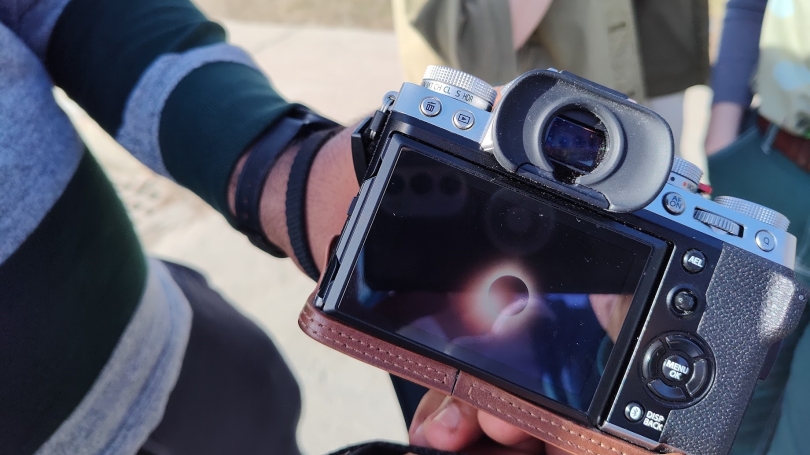
- Curriculum
- Foreign Study
- Projects & Awards
- Inclusivity
- News & Events
- People
- Our graduates
Back to Top Nav
Back to Top Nav
Back to Top Nav
Roughly 40 students, faculty and staff from Dartmouth's Classics department ventured forth to St. Johnsbury by bus and car to view the total eclipse of the sun on April 8th 2024.
One might ask how a current astronomical event relates to the study of ancient civilizations and languages. Margaret Graver, current department faculty chair, spoke to how the ancients took such events seriously,"The Latin 27 class (Roman Philosophy) has been studying passages Cicero's De Re Publica that describe how the Greeks and Romans experienced eclipses. While some people in the ancient Mediterranean feared eclipses as portents of disaster, philosophers as early as the 7th century were deeply interested in astronomy and understood both solar and lunar eclipses very well. Cicero describes a working model of the universe made of bronze and how it could be used to predict eclipses decades in advance. A similar device recovered from a shipwreck near Antikythera has been dated to the 2nd century BCE."
The first hand experience of an eclipse sparked some interesting conversations as the streets of St. J darkened. How does the scientific experience of such events co-exist with superstitious interpretations, both in ancient and modern times?
Uncommon bumper to bumper traffic jams in Vermont's Northeast Kingdom did not dampen the quality of the experience for students and faculty. Despite difficulties with everything from parking to cell service overload, the town of St. Johnsbury was welcoming and accomodating to visitors from all over. The Fairbanks Museum offered programming on the closed streets downtown and local media outlets were present in force. Back roads made for a quicker escape from all the traffic. Staff members attending remarked on how it was good to see Dartmouth students out and about in the community, visiting a part of the Upper Valley they may not have seen in person before.